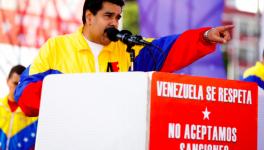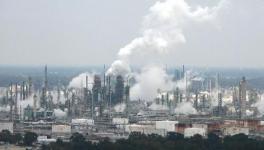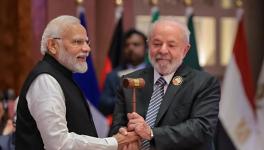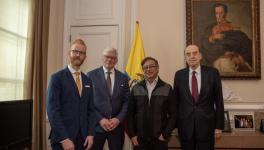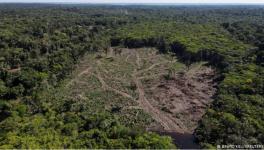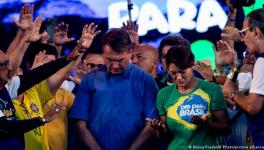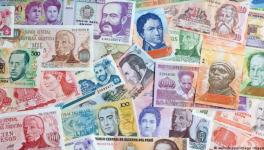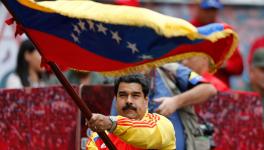Venezuela People Go In
Brazilian readers of Caros Amigos magazine and social activists were astonished by the electoral result, which gave a small margin of votes to President Maduro in the last Venezuelan elections.
Everyone was wondering what happened? The answers or quests ranged from a possible weakening of “Chavism” to manipulation by the right bourgeois media in our countries. Neither one nor the other explains the reality, in my opinion.
In recent years I had the good fortune of visiting Venezuela several times, due to educational and agricultural projects that the MST and Via Campesina International develop in that country, in partnership with Venezuelan peasant movements and Chavez government. Recently I attended the funeral of Comandante Chavez and later followed President Maduro elections.
I think I have the duty to give my testimony to the activists who read our magazine.
Since 1999, there were fundamental socio-economic transformations in Venezuelan society never seen before in its republican history. In the first three years of Chavez government 1999 – 2002, the main battle was to change the institutional frameworks which legitimated bipartisanship among the elite and their control of the oil. Those three years involved intense debate over a new constitution. It was a constituent process in which people participated actively and massively, resulting in a constituent assembly and in radical changes in people’s rights and in the Venezuelan state apparatus. The practical result of this constituent is that it was legally secured that all oil revenues belonged to the people and it should be used by the state to guarantee opportunities and rights for people to have work, education, health and housing. Republican rights, which had been denied by the Venezuelan renter bourgeoisie for one hundred years of oil. In the institutional apparatus the senate was eliminated, which was a deposit of elite lobbyists, it strengthened the House of Representatives and introduced the right of the people to revoke mandates, every two years, for any public position. It also instituted electronic voting machines and audited printed ballot, in order to prevent any fraud.
The Venezuelan bourgeoisie subordinated to U.S. capital interests responded with rage. First, they attempted a coup in April 2012, with refined cruelty which presupposed the assassination of President Chavez with the blessings of the white and Spanish Catholic Church. Remember: the cardinal of Caracas went to jail to give President Chavez the extreme unction by those in charge of the coupe, while people were on the streets not knowing where their President was. Shortly after, the cardinal died of cancer, and people say it was a punishment from God! Later, they promoted an oil boycott, organized by the sectors that traditionally lived from the revenues of the PDVSA (state enterprise) to benefit their own families.
People took to the streets and saved Chavez from the coup and PDVSA from its misappropriation. After those two fundamental victories, only then, the actual changes started, oil revenues started being used for social changes. Chavez government started implementing social programmes, during these ten years, as is it says in the constitution. It was then that a free health programme was created, their SUS [Unitary Health Programme – Brazil], which did not existed before. Since the doctors from the Venezuelan elite never accepted to treat the poor, the government brought 20 thousand doctors from Cuba, who started assisting the poor population in Venezuela. This programme was called "barrio adentro", to characterise that the doctors lived among the population. It had a very strong impact among the population, who did not know doctors, hospitals, which led the right wing candidate Capriles Randonski, to promise citizenship to all Cuban doctors. Can you believe that? Precisely him, who in the 2002 coup, invaded the Cuban Embassy armed, to see if the constitutionally elected vice-president was not hiding there….
Later, it was the time for education. New universities and courses were organized in the whole country. Every single young person in Venezuela, today, can attend the university, for free and still receive a scholarship from Ayacucho Foundation.
On the other hand, a series of public projects of social nature were implemented which transformed the whole country into a huge construction site, from the construction of subway lines, the recovery of passenger railway lines, especially in the metropolitan region, to new motorways and industrial facilities.
More recently the government implemented a broad popular housing programme, using all the available land. It is common for you to walk in the centre of Caracas and find residential construction sites, intended for the poor, who were previously hanging from the hills...
The result of ten years of programmes and social changes is that according to UNDP (UN agency for economic studies) Venezuela has the lowest social inequality in Latin America. Which means that, in their territory is where the least difference between the richest and the poorest is found and where social economic rights are secured and universal.
The problems that persist...
The population knows and criticizes publicly the problems that still persist in Venezuelan society. The Venezuelan press, be it the right wing bourgeoisie media, or the left media, are broadly free and debate, comment daily the social and economic problems that persist. There is no other country in Latin America, with the same freedom and plurality of opinion in the media, from brochures, to newspapers and TV channels.
The candidate Maduro himself, in his political campaign explained in detail the nature of the main problems that still persist, and he made a commitment to the people, that he would prioritize those problems in his government programme, in order to find the solutions. Therefore, I am witness that it was a campaign involving the debate of ideas and programmes without proselytizing, deceit, or fanaticism “chavista” which could induce people to vote for Maduro.
Maduro explained in his rallies, that they should continue to use oil revenues, for the people, to ensure the continuity and expansion of social programmes, but also to implement a broad reindustrialization programme in the country. In order for the country to be industrialized and less dependent on foreign technology, generating jobs and income for Venezuelans. That is how they are setting up tractor, computer, mobile phone factories... expanding their steel industry and cement plants; and they still need to implement more industries. They want to be an industrial power.
There are still serious persistent problems of inefficiency in the state apparatus. A consequence of one hundred years of a spendthrift state controlled by elite who turned their back to the people. The practices of corruption that permeate society are also persistent, from small businesses to the higher echelons. Maduro promised an iron fist to tackle those problems and he asked the people, above all, to be vigilant and report. It is also important to remember that the Venezuelan bourgeoisie is primarily commercial, living from imports and domestic trade. It was used to manage its businesses without paying taxes. Now, they are still trying to solve that by corrupting state officials.
The administration Maduro will have to be firm in regards to their food sovereignty programme, in order to eliminate the country´s dependency on food imports. And there is also the problem of urban social violence, in the great Caracas. A problem that is certainly smaller, in statistic terms, than it is registered in Mexico, San Salvador or Baixada Fluminense in Rio....
Faced with these challenges, they know and debated that there no magic solutions. They depend on three fundamental factors: Mobilization of the people around programmes. People must increasingly be the protagonist of government actions. It is necessary greater qualification and efficiency of the state apparatus and a greater integration with South American economies. Part of the economic and social problems in Venezuela depends on the degree of continental integration they have. Hence, the importance of their integration to Mercosul, as a trade common market. Also importance, is a growing potentialization of Unasur [Union of South American Nations], as a political network of southern governments, and above all the construction of CELAC [Community of Latin American and Caribbean States], as an alternative continental agency to OAS.
Given all that, you will ask, but then why was the difference so small?
In my opinion, because more than one million chavistas, loyal to the legacy of Chavez and to the Bolivarian programme did not vote. The vote there is not compulsory and the atmosphere of victory was and still is so hegemonic, in society, that many went to do something else and did not have time to vote. Including members of the Army, which were deployed during the whole political campaign to grapple acts of sabotage by the right sectors allied with paramilitary groups from El Salvador and Colombia, who intended to cause a black out in the country in the day of the elections. The army arrested 120 people involved in these acts of sabotage; there were many foreigners among them.
The right tried to transform a small difference into a political victory, but when they promoted riots and attacks, it eventually isolated them even further. It is consolidated in Venezuelan society a broad hegemony, in all sectors of activities from the Bolivarian programme promoted by Chavez. Therefore, in spite of the difference, there is no doubt that the Bolivarian process will continue advancing faster and more confident in Nicolas Maduro.
Hooray! Venezuelan people!
Joao Pedro Stedile is from Movimento dos Trabalhadores Rurais Sem Terra (MST), Brazil.
Translation: Ana Amorim
Disclaimer: The views expressed here are the author's personal views, and do not necessarily represent the views of Newsclick
Get the latest reports & analysis with people's perspective on Protests, movements & deep analytical videos, discussions of the current affairs in your Telegram app. Subscribe to NewsClick's Telegram channel & get Real-Time updates on stories, as they get published on our website.









